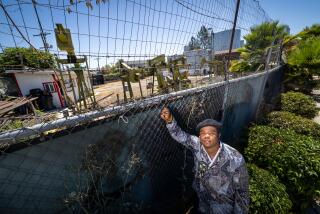Young Libyans laying groundwork for civil society
- Share via
Reporting from Benghazi, Libya — Here in the gray courthouse, in offices once occupied by judges and government lawyers, the young demonstrators who sparked a revolt in eastern Libya have planted the seeds of a political movement.
Some are Islamists in clerical garb; others wear Nike shirts or longish hair and berets. They have formed civic organizations and charities and speak of building a parliamentary democracy.
For all of them, it is uncharted ground after nearly 42 years of authoritarian rule.
Under Libyan leader Moammar Kadafi, political life was restricted to regime-controlled national congresses and local committees. Student unions, professional unions and charities were carefully watched.
Pro-Kadafi paramilitary officers from “revolutionary committees” joined student and professional unions. Even other Arab countries, with authoritarian traditions, tolerated some opposition parties and civil society groups. But in Libya, such freedoms were nonexistent.
“We are almost starting from scratch,” said Zahi Mogherbi, a retired political science professor.
Emerging from such extreme isolation, young activists speak in broad terms of democracy, grappling with their new world as they go.
“They have basic ideas of what they want,” Mogherbi said. “I wouldn’t think they have deep understandings of these issues, but they will learn as they go.”
But even if the country has lacked the history of civil society and social activism that fed the uprisings in Tunisia and Egypt, Libya has seen a flowering of new charitable and social organizations. With names like I Am Human and White Hands, they supply aid to refugee families or help to the front.
The biggest of the new groups is the February 17 Youth Syndicate. It has several offices in the central courthouse, where it runs the sound systems and podium at adjoining Martyrs Square, the heart of Benghazi’s revolution. The group ships food and military supplies to the front and monitors medicine for hospitals. It works closely with eastern Libya’s government-in-waiting.
The group is a mix of young men who puff cigarettes and drench their hair with styling gel and people such as Mohammed Araibi, 25, who heads the group’s Islamic committee.
On a recent day, Araibi kneeled in prayer by the courthouse’s stairwell and then headed to an office, where a guard slept on the floor. As he signed requests to send supplies up to the front, he was interrupted by a line of people wanting him to solve their problems.
Araibi straddles the revolution’s Islamic color and its wish for democracy.
“We are citizens,” he said. “We are with Libya and we want the revolution to work.”
He emphasized that the fighters are proud of their Islamic heritage and that it is not something to be ashamed of, despite negative connotations in the West. He said he believed that it was natural for Libyans to merge their religious beliefs with their desire for democracy.
Araibi suggested that the youths look to Islamic professors for guidance on how to proceed in building a new society. But other, more secular-leaning figures speak of professors in political science as their mentors.
Ali Attia Alia, a professor in media studies in his early 30s, has been meeting with medical students and journalism students on how to form a party. The group gathers informally in the old state lawyers’ offices next to the courthouse, where members plan newspapers and assemble charity groups. They want to collect ideas now so they’ll be ready when, they hope, Kadafi is at long last toppled and elections finally come.
“In Egypt, they had many groups,” Alia said. “We haven’t had parties in more than 40 years.”
More to Read
Sign up for Essential California
The most important California stories and recommendations in your inbox every morning.
You may occasionally receive promotional content from the Los Angeles Times.













